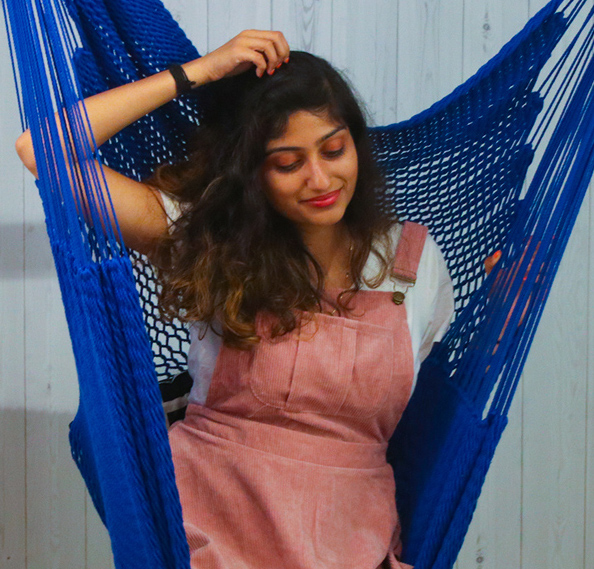By Needhi Mehta
According to the 2010 Singapore Mental Health Study, 27 per cent of single mothers have experienced a mental disorder in their lifetime. 1 Overwhelmed by the dual demands of being the family’s main caregiver and financial provider, these women usually lack the time and opportunity for proper rest or self-care. Research also shows that single mothers are five times more likely to develop mood disorders than married mothers. My interest in single mothers and their mental well-being is sparked both by a general curiosity as well as my personal background. Raised by a single mother, I have witnessed first-hand the effects of stress, worry and loneliness on a single parent. After my father passed away, my mother was forced to make the daunting transition from housewife to sole breadwinner. She spent many late nights filing taxes and working overtime to support my sister and I, and always seemed to be plagued with countless worries.
![]()
Image via Rawpixel.
Coming from the United States to embark on an eight-week summer internship at the Lien Centre for Social Innovation, I was excited to examine this topic within the context of Singapore. However, upon reviewing the existing literature, I observed a large focus on nuclear families—that is, conventional families with two parents. In contrast, there were few accounts documenting the lived experiences of single-parent families in Singapore, much less any that discussed their mental health. Noticing this gap, I was eager to increase the conversation in this domain, with a particular spotlight on Singaporean single mothers and their mental health. This article highlights the experiences of two 39-year-old single mothers who live with mental illness. Over separate in-person interviews, they shared their fears, hopes and struggles as they navigated the multiple challenges of work, single parenthood and their mental well-being.
For Mei, a typical weekday begins like this: she rises at 6 a.m. and gets her five-year-old son ready for school. After dropping him off, she returns home to cook dinner, squeezes in some exercise if she can, then heads out again for her freelance work. She picks her son up from school on the way home.
![]()
Image via Rawpixel.
Mei and I met early one morning at her house. We talked in her kitchen while she fried fish for dinner that night. She described her days as being very structured, in contrast to the more emotionally unstable times during her marriage. Mei had been suffering from post-natal depression but was not aware of it until after her husband asked for a divorce. She was even more devastated when she found out he had been unfaithful to her and that the other woman was a friend of hers. The betrayal sent her into a deep clinical depression. At her lowest point, she even considered ending her life.
Mei: I went up to the 13th floor [of my apartment building] and was prepared to jump down. But a thought came to me: my son was only two years old [at the time], and I’d been his main caregiver since birth—I had to be there for him. While I contemplated, a neighbour saw me and asked if I was okay. That interruption came at such an intense moment, catching me off guard. So I said I was fine and went back down to my unit. But this neighbour, noticing that I was crying, came after me with tissues. Grateful as I was, I also felt embarrassed and wished never to run into him again.
Mei is currently easing her way back into full-time employment after a three-year break. Though this is proving to be a major adjustment—she is still on anti-depressants and medication to help her sleep—she sees more pros than cons in the long term.
Mei: Generally, I feel well enough to work, though I sometimes struggle with loneliness. So does my son now that I’m working more. But I see full-time work as not only beneficial to my mental well-being, but also a bridge to giving my son a better life.
Tiffany* (not her real name) has struggled with pre- and post-natal depression alongside anxiety for about 10 years. Her issues with mental health were present before she became a single mother, but the symptoms worsened due to stress and dramatic life changes following her divorce. For her, one of the most challenging aspects of single parenthood is having to be emotionally strong for her two young daughters (aged nine and five).

Tiffany and her daughters on a recent vacation to Indonesia; image courtesy of Tiffany.
Tiffany: Managing my kids’ emotions, while dealing with my own, can be overwhelming. My older daughter didn’t take well to the divorce and has emotional outbursts sometimes. She’s sensitive by nature, so we spend quite a bit of time talking through her feelings. There are even moments when I wonder if her emotional issues are something genuine to address or if she just wants attention from her Mum and Dad.
She also finds herself caught between conflicting desires and responsibilities. At any given time, she is deciding if she should spend more time with her girls, take better care of herself, or make more money to sustain the family’s finances. She wistfully described her relatively more "carefree" days before her marriage ended, but emphasised that she had already closed that chapter, and is now focused on the future.
Tiffany: I had such a very different life before the divorce. In the past, most of my stress was work-related, but now I think, ‘Without work, how will I support my kids?’ I have to adapt to my new ‘normal’, which means being pragmatic and re-orienting my decisions according to how I’d like things to pan out for us in the next 10 years.
At the time of our interview, Tiffany had been on three months’ medical leave from her job as an HR representative, but had just resumed duties in a home-based arrangement. She acknowledged, however, that such flexibility is hard to come by—at her previous workplace, there was no option to return if she needed to step away for a period.
There are various educational and outreach initiatives throughout Singapore which aim to combat stigma surrounding mental illness. These include the National Council of Social Service’s Beyond the Label campaign, and the President’s Challenge 2019, among others. But until these efforts result in a visible mindset shift, societal stigma remains a major limiting factor preventing more people from discussing mental illness freely.

Photo via Pexels.
Tiffany, for instance, is not convinced she will be met with open-mindedness, and dreads the possibility of having her struggles downplayed or belittled.
Tiffany: Not everyone living with mental illness is willing to share their experiences. Maybe it’s because those who tell their stories feel shut down by a society that’s either not willing or ready to listen. Take me, for instance. Since I don’t display extreme signs of mental illness and lead a seemingly normal life, people can be dismissive and say things like, ‘Just go to work, you’re fine!’
In her view, a more inclusive society is a safe space for mental illness to be openly discussed instead of avoided. For now, though, she believes we have a ways to go. Although her employer was aware of her depression and anxiety, and amenable to time-off and home-based work, he chose not inform her colleagues about the reason for her medical leave. His decision made Tiffany realise just how uncomfortable people still are around mental illness.
Tiffany: I would’ve been completely fine if my boss had disclosed the reason for my medical leave. But he said they [the staff] were not ready for that yet, so he’d tell them I was having personal issues instead. This really wasn’t an issue of me not wanting to be open about mental illness; rather, it was about the stigma attached to sharing.
Moreover, stigma does not just come from the outside—many single parents also experience the shame of mental illness within their own families, especially in the form of insensitive remarks.
Mei: My son has been hyperactive since birth and sees a child psychologist. After the divorce, he also has trouble sleeping: he finds it difficult to fall asleep, and wakes up multiple times in the night to check if I'm next to him. My ex-husband blames me for my son's hyperactivity and sleep problems: he said I must've passed it down to him or that my ‘outbursts’ must be what’s keeping him up up at night. Tiffany: My ex-husband never believed in the severity of my mental illness. Whenever I got angry he’d ask if I’d taken my meds. It made me feel like I couldn’t get angry; if I did, it was because I hadn’t taken my medication. I felt gaslighted. It was as if my condition had become a double-edged sword.
To cope, both women take comfort in the company of close friends, in addition to seeing a psychiatrist and taking medication.
Tiffany: Medication definitely helps me. I can tell if it’s effective based on the dosage. I used to think it was all in my head, but now that I’m on my meds I’m able to look back in hindsight and see some patterns. The timeline of everything coincides nicely with how the medications were prescribed.
Mei: One night, about a week after my ex-husband asked for a divorce, I begged him against it. I pleaded with him not to break up our family, and to stay for our son's sake. But I got so upset that I ended up having a panic attack on the floor. I lay gasping until I managed to regulate my breathing and regain enough strength to crawl to the toilet to relieve myself. That was when I turned and saw my son at the bathroom door. He'd seen everything and asked, "Mummy, are you OK?". I told him I was not well and that I'd see the doctor [psychiatrist] the next day, and kept my word. Nonetheless, this incident has affected him to this day, and he still gets startled by loud noises.

Image via Pixabay.
In terms of wider community support, however, Mei and Tiffany consider this to be lacking. When they researched options for counselling or support networks, they discovered that most resources and schemes are organised by religion. But neither of them is religious.
Mei: Looking for help was really difficult because the resources were tied to particular religious organisations or groups. I was so upset—I’d been searching everywhere and I’m rejected on the basis of religion?
Tiffany: I know I can get counselling if I joined a support group at my sister’s church, but I’m hesitant to go ahead because I’m not religious. Come to think of it, when I was about to get married and later when I was a new mum, there were so many chat groups and forums available. Now, as a single mother and someone living with mental illness, I can’t seem to find any relevant support network to suit my needs. Maybe they exist, but I don’t know of any.
Additionally, Mei and Tiffany believe more can be done by the government, starting with a re-examination of existing family policies and how they impact single parents in the aftermath of divorce. Presently, laws vary according to one’s marital status (i.e., married, divorced, or unmarried), and policies tend to favour the nuclear family. These distinctions unfortunately put single parents at a disadvantage—particularly those who are unmarried or who do not have legal custody over their children. For instance, public housing is not provided until these parents turn 35 and there are even fewer provisions for single mothers in unconventional situations, such as young, low-income mothers. What would help, both women believed, is more streamlined information, aid and access to counselling.
Mei: It’d be great if the Singapore government checked in and followed up with people going through divorces, offering services like marriage counselling, legal aid, co-parenting counselling, personal counselling, and so on. There are already some aspects of these within the system but the resources are not streamlined.
Tiffany: During the mental health awareness month, people were encouraged to talk to a doctor. But in my opinion, unless the government openly supports people discussing mental illness freely, nobody is going to raise it to their doctor, or anyone else for the matter. Beyond just awareness-building, there has to be follow ups. Only with a deeper understanding of the issue can there be improvements in laws and policies.
Several children were having fun at the playground outside the café where Tiffany and I met. As we sat watching them, she stated that life—as a single parent and person with mental illness—is not all doom and gloom. Notwithstanding her challenges, she prides herself on being more in tune with people’s emotions, especially her children’s. She particularly cherishes her close relationship with her two daughters, and is grateful they can lean on one another on their respective journeys of self-growth.
Tiffany: My older daughter would come home from school and say, ‘I think I’m the only person in school who has divorced parents’, and you can tell from the way that she makes that statement that she’s upset. But episodes like that also allow us to have a conversation about why she feels that way. After that, we can try to move from a place of self-pity to a more empowered perspective. To me, that’s the silver lining.

Tiffany's daughters do the dab; image courtesy of Tiffany.
Mei herself is full of hope for the future, and encouraged by the precociousness of her young son. She smiled as she recalled two examples when he appeared wise beyond his five years.
Mei: We were waiting for the bus when he told me he wanted to buy a $7 toy. I asked him how he was going to afford it if he was only getting a $2 daily allowance, and he said that he’d save up his $2 a day so he could buy it by Friday. He asked that I only give him $1 that Friday to make the exact $7 he needed. After I reassured him that I’d still give him $2, he was so pleased. He said, ‘Wow! Then I’ll have $1 left!’ That was a sweet moment—it made me realise he’s maturing and becoming sensible. Even though he’s only five, he’s already learning to be careful about money. On another occasion, after I told him I'd left a job because of a bad boss, he asked what I'd do if I encountered another bad boss in a new job: would I leave the job again? That was pretty amusing.
As I left Mei to finish cooking dinner and Tiffany to enjoy the rest of the day to herself while her daughters were with their father, I felt nothing but admiration for these ladies. Both divorced and living with mental illness, it is easy to assume their lives tell a similar tale of loneliness, sadness and shame. Yet after speaking with them, I have instead found Mei and Tiffany’s stories to be ones of resilience, determination and profound self-awareness.
![]() Image via Rawpixel.
Image via Rawpixel.
Just as it takes a village to raise a child, support for single mothers should be a wider community responsibility. These women cannot—and should not be expected to—handle work, family and mental illness on their own. I hope this article sheds more light on this often overlooked and underserved segment of Singapore society, and inspires more dialogue and efforts to care for them and safeguard their well-being.
Banner image: Tiffany with her daughters at Hong Kong Disneyland.
Notes
1 Email correspondence with representative from the Institute of Mental Health, Singapore; M. Subramaniam, J. Vaingankar, D. Heng, K.W. Kwok, Y.W. Lim, M. Yap and S.A. Chong, “The Singapore Mental Health Study: An Overview of the Methodology”, International Journal of Methods Psychiatric Research 21 (2012): 149–57.
 |
Needhi Mehta was a Summer Associate (Editorial) at the Lien Centre for Social Innovation. A rising senior at the University of Pennsylvania, she is interested in advocacy for marginalised groups, solutions to uplift immigrant communities and raising awareness about social inequalities on campus. Needhi is part of her school’s first-generation, low-income community (FGLI), Asian American identity groups, and public health advocacy groups on campus. She is currently doing research on healthcare experiences faced by trafficked youth in Philadelphia. She can be reached at nemehta@sas.upenn.edu |








Comments